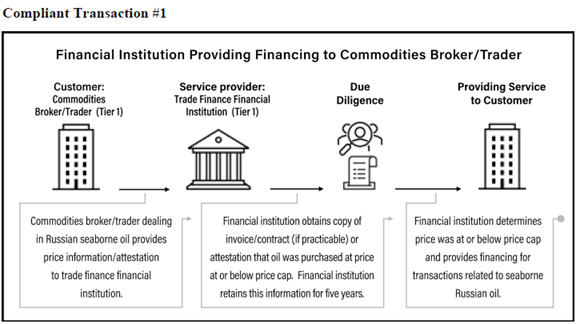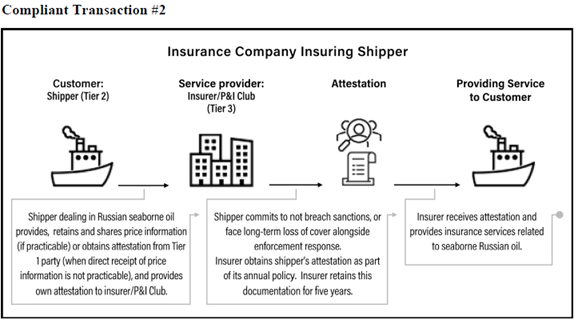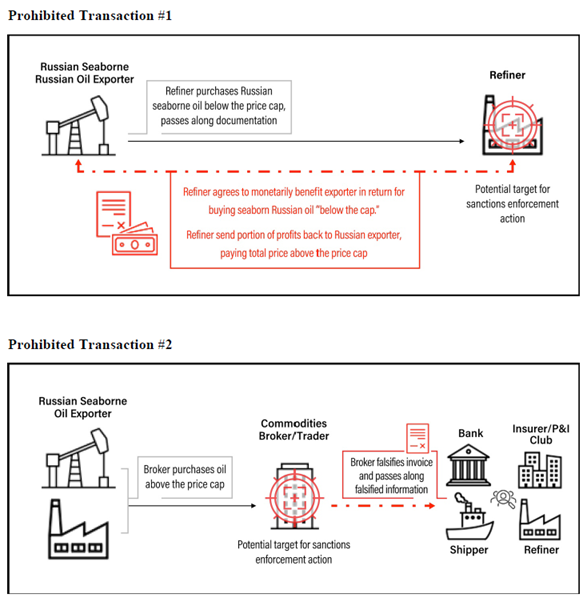On September 9, 2022 OFAC issued a preliminary guidance on the Implementation of a Maritime Services Policy and Related Price Exception for Seaborne Russian Oil in furtherance of a policy established by a coalition of countries including the G7 and the EU to create a framework for Russian oil to be exported by sea under a capped price.
New Maritime Services Policy Structured as a Ban on Services Related to Transportation of Russian Federation Origin Oil, Subject to a Price Exception
OFAC’s preliminary guidance provides notice to the market of an impending ban on services related to the maritime transportation of Russian Federation origin crude oil and petroleum products (“seaborne Russian oil”). This ban will take effect on December 5, 2022 with respect to maritime transportation of crude oil and on February 5, 2023 with respect to maritime transportation of petroleum products.
At the G7 Finance Ministers Meeting on September 2, 2022, the G7 confirmed its joint intention to implement and finalize a comprehensive plan for services that will permit oil purchased at or below a price cap to be established by an implementing coalition of countries.
To implement this policy, the U.S. Department of the Treasury (“Treasury”), Office of Foreign Assets Control (“OFAC”) anticipates issuing a determination pursuant to Executive Order (E.O.) 14071 (“Prohibiting New Investment In And Certain Services To The Russian Federation in Response to Continued Russian Federation Aggression”), which will (i) permit the exportation, reexportation, sale, or supply, directly or indirectly, from the United States, or by a United States person, wherever located, of services related to the maritime transportation of seaborne Russian oil, if the seaborne Russian oil is purchased at or below the price cap and (ii) prohibit such services if the seaborne Russian oil is purchased above the price cap.
OFAC anticipates publishing guidance on the services that are subject to the maritime services policy.
Exception for Purchases At or Below A Price Cap
Importers that purchase seaborne Russian oil at or below the price cap can reliably continue to receive maritime services related to that oil, and service providers in countries implementing the maritime services policy can provide those services for shipments of seaborne Russian oil sold at or below the price cap.
Importers and refiners who want to receive seaborne Russian oil and related maritime services can do so by purchasing the oil at or below the price cap and providing certain documentation or attestations to service providers, as explained further below.
Seaborne Russian oil purchased at prices at or below the price cap is eligible for maritime services from firms in coalition countries implementing the price exception.
Service providers for seaborne Russian oil will not face an OFAC sanctions enforcement action, provided that the service provider obtains certain documentation or attestations that the purchase price of the oil is at or below the price cap.
Price Cap Implementation
The price cap will be set by an implementing coalition of countries.
Countries that agree to implement the maritime services policy and price exception and those that commit to implementing a price cap on imports will be able to participate directly in the coalition’s consultative process that sets the price cap.
This coalition of countries will conduct a technical exercise to consider a range of factors and, aided by a rotating lead coordinator, reach consensus on the level at which the price cap is set.
OFAC will issue additional guidance on how the level of the price cap will be published and updated.
Continued Ban on Importation of Russian Oil to the U.S.
Under Executive Order 14066 (“Prohibiting Certain Imports and New Investments With Respect to Continued Russian Federation Efforts To Undermine the Sovereignty and Territorial Integrity of Ukraine”), the United States has imposed a prohibition on the importation of Russian Federation origin crude oil; petroleum; and petroleum fuels, oils, and products of their distillation.
This prohibition will remain in place alongside the U.S. implementation of the maritime services policy and price exception.
The prohibition in E.O. 14066 does not restrict the importation of Russian Federation origin crude oil; petroleum; and petroleum fuels, oils, and products of their distillation into other countries besides the United States.
New Recordkeeping and Attestation Requirements Establishing a “Safe Harbor” From Sanctions Violations
Implementation of the price exception will rely on a recordkeeping and attestation process that allows each party in the supply chain of seaborne Russian oil to demonstrate or confirm that oil has been purchased at or below the price cap.
This recordkeeping and attestation process is in addition to standard due diligence a service provider may have in place for sanctions risk, including the risk of violation of the maritime services policy through evasion.
As part of its preliminary guidance, OFAC has published different types of recordkeeping and attestation requirements for different maritime services actors, depending on those persons’ access to price information, by identifying Tier 1, Tier 2 and Tier 3 Actors.
Tier 1 actors are those persons who regularly have direct access to price information in the ordinary course of business, such as commodities brokers and refiners. Tier 1 actors should retain and share, as needed, documents that show that seaborne Russian oil was purchased at or below the price cap. Such documentation may include invoices, contracts, or receipts/proof of accounts payable.
Tier 2 actors are those persons who are sometimes able to request and receive price information from their customers in the ordinary course of business, such as financial institutions. Tier 2 actors should, when practicable, request, retain, and share, as needed, documents that show that seaborne Russian oil was purchased at or below the price cap. When not practicable to request and receive such information, Tier 2 actors should request customer attestations in which the customer commits to not purchase seaborne Russian oil above the price cap.
Tier 3 actors are those persons who do not regularly have direct access to price information in the ordinary course of business, such as insurers and protection and indemnity (P&I) clubs. Tier 3 actors should obtain and retain customer attestations in which the customer commits to not purchase seaborne Russian oil above the price cap, for example as part of their annual insurance policy renewal process or updates to their insurance policy to comply with the price cap.
Insurers may request attestations from customers that cover the entire period a policy is in place, for example for the entire length of an annual policy, rather than request separate attestations for each shipment.
OFAC has confirmed in its preliminary guidance that “this recordkeeping and attestation process is designed to create a ‘safe harbor’ for service providers from liability for breach of sanctions in cases where service providers inadvertently deal in the purchase of seaborne Russian oil above the price cap due to falsified records provided by those who act in bad faith and make material misrepresentations.
For example, where a service provider without direct access to price information reasonably relies on a customer attestation, that service provider will not be held liable for potential sanctions breaches because of those acting in bad faith who seek to cause a violation of the maritime services policy or evade OFAC sanctions.
OFAC anticipates publishing guidance for industry alongside the determination pursuant to E.O. 14071 that will implement the maritime services policy and the price exception.
OFAC has also published an exemplary matrix in its guidance with its expectations for recordkeeping and attestation requirements, as well as new recommendations for adopting risk-based measures to comply with the price exception.
OFAC has identified that, whether a Tier 1, Tier 2, or Tier 3 actor, OFAC expects those actors to retain all relevant records for five years.
New Blocking/Rejecting and Reporting Requirement
In its preliminary guidance, OFAC also advises that “U.S. persons will be required to reject participating in an evasive transaction or a transaction that violates the maritime services policy and price exception, and report such a transaction to OFAC.”
Red Flags Identified by OFAC
OFAC recommends that persons providing services related to the maritime transportation of seaborne Russian oil in compliance with the price exception be vigilant about the red flags, which may indicate possible evasion, including: (i) evidence of deceptive shipping practices1; (ii) refusal or reluctance to provide requested price information; (iii) unusually favorable payment terms, inflated costs, or insistence on using circuitous or opaque payment mechanisms; (iv) indications of manipulated shipping documentation, such as discrepancies of cargo type, voyage numbers, weights or quantities, serial numbers, or shipment dates; (v) newly formed companies or intermediaries, especially if registered in high-risk jurisdictions; and (vi) abnormal shipping routes2.
OFAC recognizes that although not every service provider may have access to all information about a transaction involving seaborne Russian oil—OFAC recommends that service providers review the information available to them for potential red flags.
OFAC anticipates publishing information to alert the industry of possible red flags for evasion of the price cap.
Vigorous Enforcement of the Price Cap is Expected; Implementing the Recordkeeping and Attestation Requirements Is Accordingly Strongly Recommended
While OFAC has identified a safe harbor for cases where service providers inadvertently deal in oil purchased above the price cap due to falsified records provided by illicit actors (and those actors have complied with OFAC’s recommended recordkeeping and attestation requirements), OFAC has also cautioned the marketplace in this guidance that “persons that make significant purchases of oil above the price cap and knowingly rely on service providers subject to the maritime services policy, or persons that knowingly provide false information, documentation, or attestations to such a service provider, will have potentially violated the maritime services policy and may be a target for a sanctions enforcement action.”
Moreover, enforcement is likely to cut across borders and be an international effort among all implementing coalition countries, as OFAC has advised that “Treasury and the U.S. Government broadly anticipates working with other members of the coalition implementing the maritime services policy to enforce the price cap, including by sharing information.”
OFAC has also published exceedingly suggestive illustrative guidance, reflecting examples of permitted and prohibited transactions in the marketplace, as follows:
As shown in these examples, bad actors in the maritime services supply chain who falsify documentation or attempt to evade or avoid the price cap will be targets of sanctions enforcement by OFAC or other authorities.
Likewise, other actors in the maritime services supply chain who do not implement OFAC’s guidance or who recklessly deal in seaborne Russian oil without taking steps to implement a risk-based compliance program including recordkeeping and attestation requirements as applicable to those persons’ business are potential targets of a sanctions enforcement action if they inadvertently engage in a prohibited transaction.
We will continue to closely monitor developments in this space. If you have any questions or concerns about U.S. sanctions, please contact Bruce Paulsen or Brian Maloney at Seward & Kissel’s Sanctions Practice Group.
1 OFAC advised that tactics used to facilitate sanctionable or illicit maritime trade also serve as indicators that actors may be evading the price cap. Such tactics include: disabling or manipulating the automatic identification system (AIS) on vessels; physically altering vessel identification; falsifying cargo and vessel documents; ship-to-ship (STS) transfers; voyage irregularities; false flags and flag hopping; and complex ownership or management. The U.S. Departments of State and Treasury, and the U.S. Coast Guard issued a global advisory on May 14, 2020 discussing these red flags and best practices in further detail.
2 OFAC advised that whether the use of a shipping route or transshipment point for shipping seaborne Russian oil is abnormal can be determined by past practice or historic AIS data, a lack of historic AIS data for a particular tanker or fleet of tankers owned by a particular shipper, transshipment through one or more jurisdictions for no apparent economic reason, and sudden unexplained changes in route.





